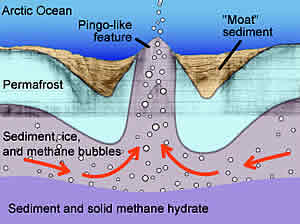A shitload of cows standing around farting — Not!
Another brick in the wall as a research team has found that a powerful global warming component, methane gas, is seeping from the Arctic seabed, which is nothing new (a study last year revealed the methane time bomb), but for the first time the process appears to be at a faster rate than previously figured.
From the BBC:
Professor Tim Minshull of the National Oceanography Centre at Southampton told BBC News: “We already knew there was some methane hydrate in the ocean off Spitsbergen and that’s an area where climate change is happening rather faster than just about anywhere else in the world.”
…
Professor Minshull said: “Our survey was designed to work out how much methane might be released by future ocean warming; we did not expect to discover such strong evidence that this process has already started.”
This is another indicator global warming is much further along than anyone supposed just months ago, and this methane gas phenomenon is a baddie, it creates way-more heat and rising temperatures than does carbon.
 Methane is over 20 times more effective in trapping heat in the atmosphere than carbon dioxide (CO2) over a 100-year period — the Arctic region is heating up, so warm apparently, the permafrost lid on the sea floor developed holes, thus leaking methane up though “methane chimneys.”
Methane is over 20 times more effective in trapping heat in the atmosphere than carbon dioxide (CO2) over a 100-year period — the Arctic region is heating up, so warm apparently, the permafrost lid on the sea floor developed holes, thus leaking methane up though “methane chimneys.”
The principal component of natural gas, methane is extremely combustible.
(Illustration found here).
Heat over ice seems to be hotter than anywhere else.
Methane burps to the surface and becomes an unpredictable, flammable entity.
According to history these “burps” can be near-fatal to humanity as complied in Michael Benton‘s When Life Nearly Died: The Greatest Mass Extinction of All Time, when most of all things living were nearly wiped out by a quick, CO2/methane overload.
Methane apparently has been in the air for eons, but human mechanical industry really, really put the icing on the cake, so to speak: The abundance of methane in the earth’s atmosphere in 1998 was 1745 parts per billion, up from 700 ppb in 1750, before the start of the Industrial Revolution.
The environmental problem facing the planet is nearly-beyond catastrophic.
In an increasingly interesting age with glaring, heinous financial meltdowns, unreasonable perpetual wars and other such-tomfoolery, it’s easy to overlook something coming at us slowly and easily like a comfortable form of mass asphyxia.
Read a good analysis and background on the methane “burps” at Climate Progress.